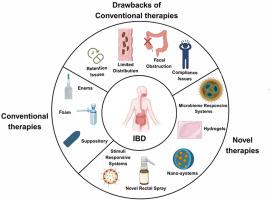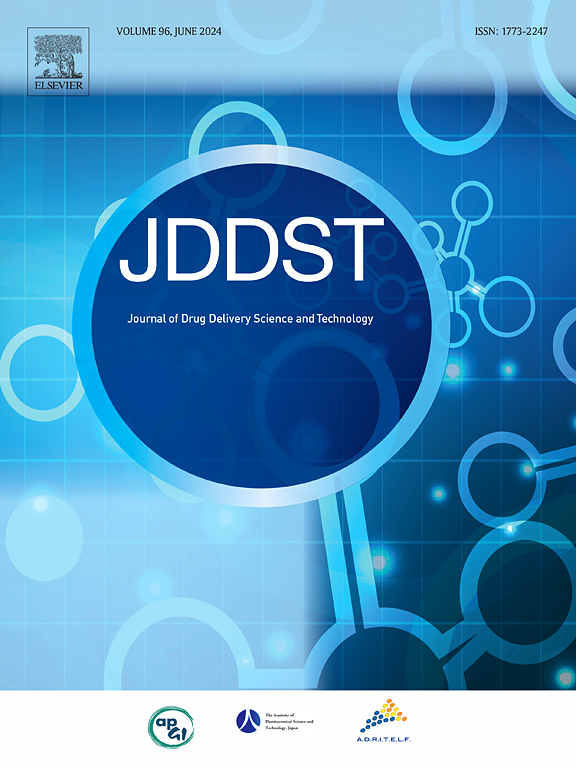直肠给药系统(RDDS)在炎症性肠病(IBD)治疗中的应用:现状、挑战和新兴策略
IF 4.9
3区 医学
Q1 PHARMACOLOGY & PHARMACY
Journal of Drug Delivery Science and Technology
Pub Date : 2025-09-25
DOI:10.1016/j.jddst.2025.107567
引用次数: 0
摘要
直肠给药系统(RDDS)作为治疗炎症性肠病(IBD)的一种实用和有针对性的方法,特别是在溃疡性结肠炎(UC)和克罗恩病(CD)的情况下,正越来越多地被探索。与经常与全身副作用和靶向性差作斗争的口服或注射疗法不同,RDDS允许药物直接作用于炎症部位,提高药物的生物利用度并减少不必要的全身暴露。随着时间的推移,研究人员试图解决直肠给药的局限性,包括不适、可变潴留和配方不稳定。这些挑战正在通过创新的设计策略得到缓解。药物载体的最新进展,如纳米颗粒、黏附水凝胶、热敏制剂和微生物反应系统,促进了更精确和持续的药物释放。与此同时,天然化合物,特别是植物化学物质,正被纳入这些载体中,以赋予抗炎和抗氧化特性,同时最大限度地减少副作用。然而,尽管有很好的实验室结果,临床转化仍然有限。解剖变异、患者依从性和长期制剂稳定性等挑战继续减缓进展。这篇综述探讨了IBD的RDDS的最新进展,反映了所取得的科学进展和仍然存在的差距。它还强调了对以患者为中心的跨学科策略的日益增长的需求,包括基于纳米颗粒的载体,聚合物和微生物组反应系统的进展以及基于植物化合物的配方,以充分实现直肠给药在IBD护理中的治疗潜力。本文章由计算机程序翻译,如有差异,请以英文原文为准。

Rectal drug delivery systems (RDDS) in inflammatory bowel disease (IBD) therapy: current status, challenges and emerging strategies
Rectal drug delivery systems (RDDS) are increasingly being explored as a practical and targeted approach for managing inflammatory bowel disease (IBD), particularly in cases of ulcerative colitis (UC) and Crohn's disease (CD). Unlike oral or injectable therapies that often struggle with systemic side effects and poor targeting, RDDS allow medications to act directly at the site of inflammation, improving drug bioavailability and reducing unwanted systemic exposure. Over time, researchers have sought to address the limitations of rectal administration, including discomfort, variable retention, and formulation instability. These challenges are being mitigated through innovative design strategies. Recent advances in drug carriers, such as nanoparticles, mucoadhesive hydrogels, thermosensitive formulations, and microbiome-responsive systems, have facilitated more precise and sustained drug release. In parallel, natural compounds, particularly phytochemicals, are being incorporated into these carriers to impart anti-inflammatory and antioxidant properties while minimizing side effects. However, despite promising laboratory outcomes, clinical translation remains limited. Challenges such as anatomical variability, patient compliance, and long-term formulation stability continue to slow progress. This review explores recent developments in RDDS for IBD, reflecting on both the scientific advances made and the gaps that remain. It also highlights the growing need for patient-centric, interdisciplinary strategies, encompassing advances in nanoparticle-based carriers, polymeric and microbiome-responsive systems along with phytocompound-based formulations to fully realise the therapeutic potential of rectal delivery in IBD care.
求助全文
通过发布文献求助,成功后即可免费获取论文全文。
去求助
来源期刊
CiteScore
8.00
自引率
8.00%
发文量
879
审稿时长
94 days
期刊介绍:
The Journal of Drug Delivery Science and Technology is an international journal devoted to drug delivery and pharmaceutical technology. The journal covers all innovative aspects of all pharmaceutical dosage forms and the most advanced research on controlled release, bioavailability and drug absorption, nanomedicines, gene delivery, tissue engineering, etc. Hot topics, related to manufacturing processes and quality control, are also welcomed.

 求助内容:
求助内容: 应助结果提醒方式:
应助结果提醒方式:


